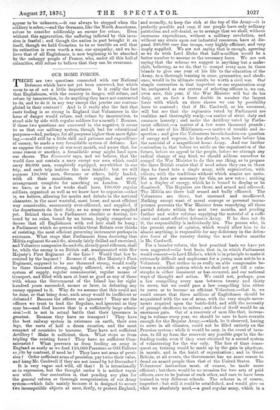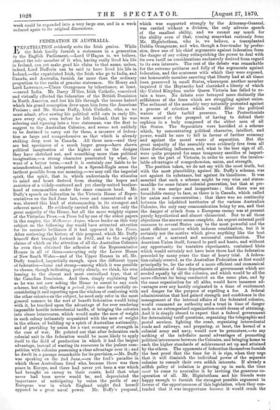OUR HOME FORCES.
THERE are two questions connected with our National Defences which have not yet been answered, but which seem to us of not a little importance. Is it really the fact
that Englishmen, with the country in danger, will refuse, and refuse by insurrection, to do anything they have not contracted
to do, and to do it in any way except the precise one contem- plated in their contract ? And is it really also the fact that caste feeling is so strong in England that Volunteers in the hour of danger would refuse, and refuse by insurrection, to stand side by side with regular soldiers for a month ? Because, if those two questions are answered in the negative, it seems to US that our military system, though bad for educational purposes—bad, perhaps, for all purposes higher than mere fight- ing,—could still by a little skill and patience and expenditure of money, be made a very formidable system of defence. Let us suppose the country at war next month, and aware that, for some reason or another, a formidable army might land upon our shores. The Economist says, and we believe, that the world does not contain a navy except our own which could carry 80,000 men, completely equipped, anywhither in one trip, and each trip isolates the men landed ; but we will suppose 150,000 men, Germans or others, fairly landed, with all their munitions, their supplies, and every arrangement complete for marching on London. Well, we have, or in a few weeks shall have, 100,000 regular soldiers, organized as well as we know how to organize,—that is, we believe, allowing for merits and defects in the national character, in the most wasteful, most loose, and most efficient way conceivable, enormously over-officered, and supplied, if the departments do their duty, as no army ever was supplied yet. Behind them is a Parliament absolute as destiny, fet- tered by no rules, bound by no forms, legally competent to decree that all Englishmen with red hair shall be hung ; a Parliament which no person within Great Britain ever thinks of resisting, the most efficient governing instrument perhaps in existence. What stops that Parliament from decreeing that Militia regiment So-and-Bo, already fairly -drilled and exercised, and Volunteer companies So-and-So, alreadygood riflemen, shall be, while the enemy is on British soil, amalgamated with Her Majesty's First Regiment of the Line ? Would that law be resisted by the bayonet ? Because if not, Her Majesty's First Regiment, supposed to be one thousand strong, would really be three thousand strong, amply officered, with a regular system of supply, regular commissariat, regular means of transport, and filled with men at least as good as any of those with whom the Government of the Island has for eight hundred years succeeded, sooner or later, in defeating any enemy opposed to it. Why do we assume that this could not be done, or that being done, such army would be inefficient or defeated? Because the officers are ignorant ? They are the officers we trust to lead the Regulars, and ignorant as they may be—and God knows that is a sufficiently large admis- sionl—it is not in actual battle that their ignorance is greatest. Because they have no transport ? They have the best railway system in existence on earth, their own legs, the carts of half a dozen counties, and the most compact of countries to traverse. They have not sufficient Artillery ? Make it sufficient, then. What stops us from tripling the existing force ? They have no sufficient Cora- missariat ? What prevents us from feeding an army in England as easily as we feed 110,000 Foresters or Odd Fellows en fete by contract, if need be ? They have not arms of preci- sion? Order sufficient arms of precision, pay twice their value, and hang Mr. Cardwell if they are not issued by 1st December?
It is very vague and wild, all that? It is intentionally so in expression, but the thought under it is neither vague nor wild. Our contention is, that pending any plan for the general reform or thorough reorganization of our Army system—which fails mainly because it is designed to secure two incompatible objects at once, firstly, to protect England, and Secondly, to keep the rich at the top of the Army—it is perfectly possible and easy, if our people have only ordinary patriotism and self-denial, so to arrange that we shall, without enormous expenditure, without a military revolution, and without any strain upon our industrial resources, have at dis- posal 300,000 very fine troops, very highly efficient, and very amply supplied. We are not saying that is enough, agreeing as we do with Lord Elcho that half-a-million would be a better number to assume as the necessary force. We are not saying that the scheme we suggest is anything but a make- shift, believing, as we do, that to compel every man in these islands to give one year of his life to the education of the Army, to a thorough training in arms, gymnastics, and obedi- ence, would in its ultimate results be worth a civil war. Out simple contention is, that imperfect as our organization may be, antiquated as our system of selecting officers is, we can, even now, this year, if the War Minister will but do his duty, set on foot a force double in number the largest force with which on these shores we can by possibility have to contend ; that if Mr. Card well, or his successor, will but see that the regiments voted by Parliament are realities and thoroughly ready,—a matter of strict duty and common honesty ; and make the Artillery voted by Parlia- ment efficient,—a matter of a few score thousand pounds ; and be sure of his Militiamen,—a matter of trouble and in- spection ; and give the Volunteers breech-loaders—a question of energy and expense, he has already, now, here before him the material of a magnificent home Army. And our further contention is, that before we settle on the organization of the future, before we appeal to the people, before we attempt any radical change of any kind, we should address ourselves to compel the War Minister to do this one thing, so to prepare the three British armies that if need arises they can in three days be fused into a single army, with organization, with officers, with the traditions without which armies are mobs. No new Acts are necessary for this, no new votes ; nothing but a display of energy, which he is bound to display or be dismissed. The Regulars are there, and armed and officered. The Militia are there half armed and badly officered. The Volunteers are there, but unarmed and unofficered. Nothing except want of moral courage or personal incom- petence prevents the War Minister from remedying all those partial defects within the next two months, and pending farther and wider reforms supplying the material of a suffi- cient and most effective defensive Army. If he does not do it, the responsibility is individually his. The person who, in the present state of opinion, which would allow him to do almost anything, is responsible for any deficiency in the defen- sive force of the country during the next twelve months is Mr. Cardwell.
For a broader reform, the best practical basis we have yet seen suggested—the best basis, that is, to which Parliament would consent—is Lord Elcho's, which is in principle to make it extremely difficult and unpleasant for a young man not to be a Volunteer. That strikes us as really an able compromise be- tween a scientific system which we shall not get till a cata- strophe is either imminent or has occurred, and our national ways of thought and action. We could not, perhaps, pass a law compelling every man between twenty and thirty to serve, but we could pass a law compelling him either to serve or to become an efficient Volunteer,—that is, we could ensure that three millions of Englishmen should be acquainted with the use of arms, with the very simple move- ments required upon the battle-field, and with the necessity of prompt obedience to orders ; and that of itself would be an enormous gain. Out of a reservoir of men like that, increas- ing in volume every year, we should be sure to have recruits enough for the Regular Army,—which, be it observed, having to serve in all climates, could not be filled entirely on the Prussian system ; while it would be easy, in the event of inva- sion, to fill up from the reservoir any possible gaps'in the de- fending ranks, even if they were obtained by a second system of volunteering for the war only. The loss of time conse- quent on training would be made up by the gain in physique, in morale, and in the habit of organization ; and in Great Britain, at all events, the Government has no more reason to dread an armed people than that of the United States. The Volunteers' instruction must, of course, be made more efficient ; but there would be no occasion for two sets of paid officers, sure to be jealous of each other, and sure to have been trained in very different schools. The scheme is, of course, imperfect ; but still it could be established, and would give us what we absolutely need,—a good regular army, which in a week could be expanded into a very large one, and in a week reduced again to its original dimensions.































 Previous page
Previous page